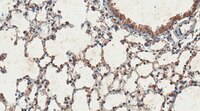ABS1035 Sigma-AldrichAnti-FMO2 Antibody
Detect FMO2 using this Anti-FMO2 Antibody validated for use in Western Blotting, Immunohistochemistry.
More>> Detect FMO2 using this Anti-FMO2 Antibody validated for use in Western Blotting, Immunohistochemistry. Less<<お勧めの製品
概要
| Replacement Information |
|---|
主要スペック表
| Species Reactivity | Key Applications | Host | Format | Antibody Type |
|---|---|---|---|---|
| H, M | WB, IHC | Rb | Serum | Polyclonal Antibody |
| References |
|---|
| Product Information | |
|---|---|
| Format | Serum |
| Presentation | Rabbit polyclonal serum with 0.05% sodium azide. |
| Quality Level | MQ100 |
| Physicochemical Information |
|---|
| Dimensions |
|---|
| Materials Information |
|---|
| Toxicological Information |
|---|
| Safety Information according to GHS |
|---|
| Safety Information |
|---|
| Packaging Information | |
|---|---|
| Material Size | 200 µL |
| Transport Information |
|---|
| Supplemental Information |
|---|
| Specifications |
|---|
| Global Trade Item Number | |
|---|---|
| カタログ番号 | GTIN |
| ABS1035 | 04055977315738 |
Documentation
Anti-FMO2 Antibody (M)SDS
| タイトル |
|---|
Anti-FMO2 Antibody 試験成績書(CoA)
| タイトル | ロット番号 |
|---|---|
| Anti-FMO2 -Q2648343 | Q2648343 |









